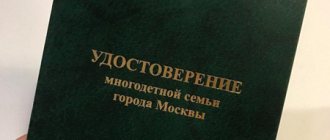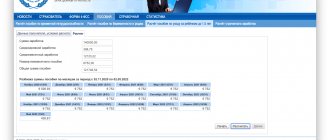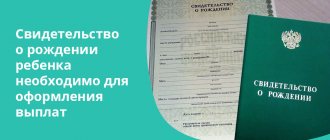What is a large family
The Family Code of the Russian Federation does not determine which family is classified as large. Each subject uses its own interpretation of the concept in accordance with regional legislation and customs.
The provisions of GOST R 52495-2005 determine that a large family is a family with three or more children in accordance with the threshold for large families, which is established by regional executive authorities.
Children who are not taken into account for recognition as a large family:
- those who have reached 18 years of age, excluding those studying full-time under the age of 23;
- in respect of which parents are deprived of their rights or have their rights limited;
- under guardianship;
- on state support.
Assigning the status of having many children is not related to whether the child is natural or adopted.
State guarantees of a social nature can be monetary or in kind. The number of children determines the types of social guarantees and their sizes.
Federal payments
Federal legislation does not provide for the payment of benefits to large families. Families raising three or more children may qualify for monthly payments in the general manner.
Thus, a person caring for a child until he reaches 1.5 years of age can receive a monthly allowance:
- for child care in the amount of 40% of the average earnings of the worker providing care (average earnings are calculated for two years preceding the year the benefit was assigned);
- for unemployed citizens - in a fixed amount established by the legislator.
Read about the new rules for paying benefits for child care up to 1.5 years from 2021 in the Ready-made solution from ConsultantPlus. Trial access to the legal system is free.
At the federal level, support for large families is provided only in the form of subsidies and benefits. In particular, in accordance with the Decree of the President of the Russian Federation “On measures...” dated 05.05.1992 No. 431, such benefits include:
- extraordinary admission of children to kindergartens;
- one day a month for free admission to amusement parks and museums;
- discount on utilities of at least 30%.
Federal benefits: personal income tax deduction
The federal legislative level makes it possible to count on tax benefits for large families under personal income tax.
State aid is provided in the form of a deduction. This means that the person will not receive the money in hand, and the taxable base - the amount of funds on which a tax of 13% is levied - will decrease by a certain amount. As a result, upon payment of income tax, a member of a large family will have a larger salary on hand.
Personal income tax deduction for children is given to the following categories:
- legally married parents;
- stepfather or stepmother;
- a person who pays alimony after a divorce;
- guardian, adoptive parent, trustee.
In 2021, the amount of deduction:
- 1400 rubles - for the first two children;
- 3000 rubles - for the third and subsequent ones.
If the payer is raising a disabled child, a separate deduction amount is established:
- 12,000 rubles - for a parent;
- 6000 rubles - for an adoptive parent or guardian.
Deductions are made for each disabled child under 18 years of age, and if he or she is studying full-time, up to 24 years of age. This type does not cancel deductions based on the order of children. For example, a third disabled child will be entitled to deductions in the amount of 15,000 rubles.
The deduction applies to the third and subsequent children even if the previous children became adults and lost the right to such a measure of support.
The amount of support measures doubles if children are raised by one parent (for example, the death of a spouse has occurred). In case of divorce and refusal to pay alimony, the amount does not increase.
A double deduction is possible if the second parent voluntarily refuses his deduction. It must be borne in mind that such a refusal is impossible if:
- no official work;
- the person is on parental leave;
- the citizen is registered with the employment service.
The start of the use of the deduction is the month of birth (adoption), the end is the age of majority, as well as the excess of the established limit by the amount of the parent’s income. In 2021 - 350,000 rubles, that is, in the month when the total income exceeds the named amount, the use of the deduction will stop.
How to apply
Registration takes place at the place of work. An application should be sent to the employer with a request to apply the deduction, listing existing children and noting their age and status.
The following must be attached to the application:
- birth (adoption) documents;
- medical certificate (if the child is disabled);
- a certificate from the place of study confirming its full-time course;
- passport.
The single parent also provides:
- documents on the death of the spouse;
- a court decision declaring the second spouse missing;
- certificate by f. 25 (when entering information about the father from the words of the mother into the birth certificate);
- passport.
Guardians (trustees) provide papers confirming their status.
An individual entrepreneur with many children can also receive a deduction by contacting the tax office.
Results
So, benefits for large families in 2021 are awarded only in those regions whose authorities have introduced relevant provisions into the legislation. There are regions (currently there are more than 60 of them) where benefits for the third and subsequent children are co-financed by the federal budget, but such payments are only available to low-income families. In general, at the federal level, the legislator only recommends that regional authorities establish additional benefits for large families and independently determine a list of other preferences that will improve the standard of living of families with three or more children.
Sources: federal law “On the general principles of organization of legislative (representative) and executive bodies of state power of the constituent entities of the Russian Federation” dated October 6, 1999 No. 184-FZ
You can find more complete information on the topic in ConsultantPlus. Free trial access to the system for 2 days.
Regional benefits
The Tax Code of the Russian Federation does not establish transport, property or land benefits for members of large families at the Federation level.
This happens because transport tax is the responsibility of the subjects, and land and property tax is the responsibility of the local area of responsibility. In this regard, the authority to introduce additional support measures has been given to the legislative bodies of regions or municipalities.
To the ground
Land support measures are provided in several options. It can be:
- discount on payment of up to 50%;
- reduction of the calculation base;
- exemption from payment.
For example, in the Rostov region in many areas large families do not pay tax. Benefits are relevant for residents of the capital, where prices for plots are high. For example, in Moscow, the tax base can be reduced by 1 million rubles, and in many areas of the region there is a 50% discount applied when the average income for each family member is below the subsistence level.
Transport
Transportation benefits are the region's diocese. Subjects have different algorithms:
- waiver of collection for machines of a certain capacity;
- exemption from payment of one of the parents;
- discount on amount.
Transport tax support measures do not need to be confirmed regularly. They are announced only once. Their validity is prolonged for the period of ownership of the car or loss of status by the person.
Property taxation
Many regions practice exemption from property tax. Thus, Ryazan made it possible not to pay a fee for 1 object for each type of property. This means that the benefit can be provided for an apartment, a dacha, or a garage at the same time. The condition is that the income of family members is below the regional subsistence level.
How to apply
Information on benefits for the category of families under consideration is contained in local legislative acts. You can contact the Federal Tax Service department with this question and register it there. To do this, you need to send a package of documents to the tax office:
- application in the prescribed form (can be found on the Federal Tax Service website);
- documents confirming family status;
- identification document of the applicant;
- birth documents of children.
The application can be submitted in person, sent by mail, or completed through the taxpayer’s account on the website.
Thus, there are no uniform tax benefits, so citizens need to closely monitor changes in legislation in their region of residence.
Payments at the regional level
Regional authorities have the right to independently establish the amount and procedure for paying benefits to large families (subparagraph 24, paragraph 2, article 26.3 of the Law “On General ..." of October 6, 1999 No. 184-FZ).
In practice, the rights of citizens are implemented in different ways - it all depends on the financial capabilities of the region. For example, in Moscow, large families receive the following types of material support:
- a single payment for the birth or adoption of three children at the same time (Clause 3, Part 1, Article 6 of the Moscow City Law “On Social...” dated November 23, 2005 No. 60);
- monthly compensation payment to reimburse expenses associated with the increase in the cost of living (for families with three or more children) - paid for each child until he reaches the age of 18 (Clause 5, Part 1, Article 7, Article 11 of Law No. 60 );
- monthly payment for the purchase of children's goods (for families with five or more children) (Clause 7, Part 1, Article 7 of Law No. 60);
- annual payments for holidays (International Family Day and Knowledge Day) - provided to families raising 10 or more children, provided that at least one of them is under 18 years old (Article 18 of Law No. 60);
- annual payment for the purchase of children's clothes for school (Article 19 of Law No. 60).
Transport tax
The size and procedure for calculating transport tax are also determined by the regions. For example, in the Nizhny Novgorod region, a large family may not pay tax for one car whose power does not exceed 150 hp. In Moscow, one of the parents does not pay for his car, regardless of its capacity.
The tax benefit is also issued by the Federal Tax Service. It is enough to submit documents once. It will be valid until the car is sold or until the status of a large family is lost. If the spouses purchase another car and decide to re-register the deduction for it, they must contact the tax office again.
How to get a plot of land.
Families raising more than 3 minors have the right to receive a plot of land for the construction of a building.
The specifics of obtaining this benefit are regulated by legislative acts issued at the regional level.
In the Moscow region, to register ownership of a plot of land, you will need to contact representatives of local government bodies.
The Administration will provide detailed advice upon receipt of the service.
It should also be taken into account that the “Housing” program has been launched in the region, thanks to which low-income families can receive a subsidy for the purchase of real estate.
Land plots are not provided on the territory of Moscow, which is legally regulated by Department Letter No. DGI-EGR-3685/16-1 dated February 12, 2016.
At the same time, families standing in line to improve their living conditions can receive compensation. Its size is the standard value of the property.
The subsidy must be used no later than six months after its approval.
Providing plots to large families in 2021.
Who receives targeted assistance?
Benefit categories of Russian families can count on benefits of this type, which include:
- having many children or single parents;
- families with children with disabilities;
- families in which at least one parent is disabled of the 1st or 2nd group;
- unemployed parents in families with minor children.
Preferential categories of Russian citizens classified as low-income, including disabled people of the 1st and 2nd groups, also have the right to apply for benefits from the state. And also with disability of the 3rd group and various physical deviations.
Help for those who are just planning children
1. Monthly payments to a pregnant woman
If the expectant mother is in a difficult situation, she has the right to monthly cash assistance, which is equal to half the subsistence level. An indispensable condition is that a woman must register for pregnancy before her pregnancy exceeds 12 weeks. This support measure has been in effect since July of this year. The amount of assistance is calculated at the regional rate for able-bodied persons and on average in Russia is just over 6 thousand rubles (Here and below are approximate amounts of payments. More accurate amounts can be obtained from a specialist or found in the relevant federal law.)
2. Maternity payments
Maternity benefits (also called “maternity benefits”) are paid as a lump sum for the entire period of maternity leave. The amount is calculated according to a certain formula, but cannot exceed the maximum and minimum limits established by law. Amount of maternity payments:
- corresponds to the average salary for the previous 2 years (24 months);
- cannot be less than 58.9 thousand rubles;
- cannot be more than 472.2 thousand rubles (based on 194 vacation days when a woman was carrying two, three children, etc.).
Thus, if a woman takes maternity leave in 2021, then her earnings in 2019-2020 are taken into account to calculate the benefit. If the work experience is insignificant (less than six months), the benefit will be assigned based on the regional cost of living. Also, this type of benefit is assigned when adopting a small child whose age is less than 3 months. The payment will be calculated from the date of registration of the adoption to the seventieth day (110th day for two or more children adopted at the same time). These payments are not subject to income tax (NDFL).









